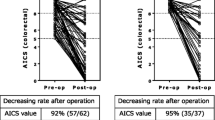Abstract
The profile of serum glycoproteins is altered in malignancy with a relative increase in acute phase reactant proteins. A prospective study has been performed to investigate three sugar moieties (hexose, hexosamine and sialic acid) of these glycoproteins in the serum of large-bowel cancer patients as a possible guide to recurrence, and to compare these three variables with carcinoembryonic antigen (CEA). The three variables indicated the presence of colorectal cancer in over 65 per cent of 107 cancer-bearing subjects. Furthermore, the appearance of metastatic disease was associated with abnormalities in these variables in 10 of 11 patients, and appears more accurately reflected than with CEA. However, the three variables and CEA are cumulative in their value for predicting recurrent cancer. Monitoring of acute phase reactant proteins may therefore be of potential clinical benefit for monitoring of colorectal cancer patients at high risk of recurrence.
Similar content being viewed by others
References
Evans JS, Vana J, Aronoff BL, Baker HW, Murphy GP. Management and survival of carcinoma of the colon: results of a national survey by the American College of Surgeons. Ann Surg 1978;188:716–20.
Minton JP, James KK, Hurtubise PE, Rinker L, Joyce S, Martin EW Jr. The use of serial carcinoembryonic antigen determinations to predict recurrence of carcinoma of the colon and the time for a second-look operation. Surg Gynecol Obstet 1978;147:208–10.
Beatty JD, Romero C, Brown PW, Lawrence W Jr, Terz JJ. Clinical value of carcinoembryonic antigen: diagnosis, prognosis, and follow-up of patients with cancer. Arch Surg 1979;114:563–7.
Winzler RJ Smyth IM. Studies on the mucoproteins of human plasma. II. Plasma mucoprotein levels in cancer patients. J Clin Invest 1948;27:617–9.
Almquist PO, Lausing E. A study of serum glycoproteins in cancer. Scand J Clin Lab Invest 1957;9:179–89.
Henry RJ, Cannon DC, Winkelman JW. Clinical chemistry: principles and technics. 2nd ed. Hagerstown: Harper & Row, 1974;413:470.
Warren L. The thiobarbituric acid assay of sialic acids. J Biol Chem 1959;234:1971–5.
Nie NH, Hadlai Hull C, Jenkins JG, et al. Statistical package for the social sciences. 2nd ed. New York: McGraw-Hill 1975:434.
Steward AM, Nixon D, Zamcheck N, Aisenberg A. Carcinoembryonic antigen in breast cancer patients: serum levels and disease progress. Cancer 1974;33:1246–52.
Cohen AM, Wood WC. Carcinoembryonic antigen levels as an indicator for reoperation in patients with carcinoma of the colon and rectum. Surg Gynecol Obst 1979;149:22–6.
Author information
Authors and Affiliations
Additional information
This study was supported by the Rowden White Foundation
About this article
Cite this article
Walker, C., Gray, B.N. & Barnard, R. Serum glycoproteins in diagnosis and monitoring of patients with large-bowel cancer. Dis Colon Rectum 24, 171–175 (1981). https://doi.org/10.1007/BF02962327
Received:
Issue Date:
DOI: https://doi.org/10.1007/BF02962327




